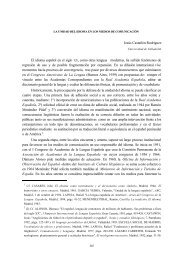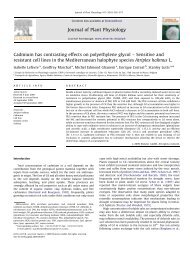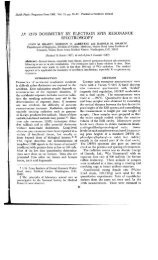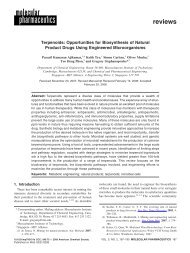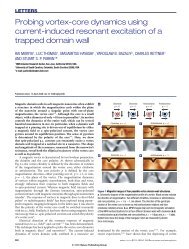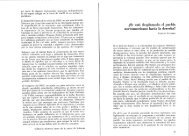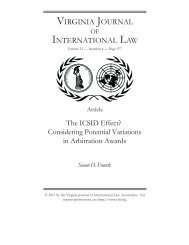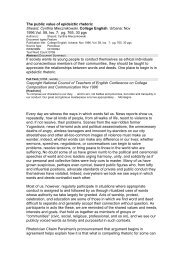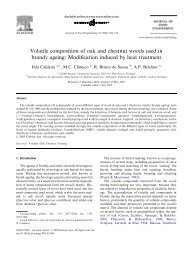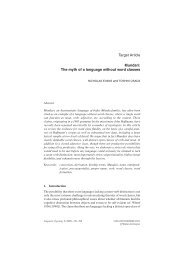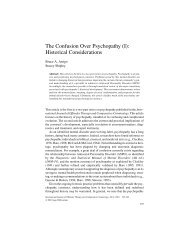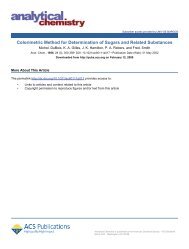Catullus 64 and the Conflict between A mores and Virtutes
Catullus 64 and the Conflict between A mores and Virtutes
Catullus 64 and the Conflict between A mores and Virtutes
You also want an ePaper? Increase the reach of your titles
YUMPU automatically turns print PDFs into web optimized ePapers that Google loves.
208 SHERRON E. KNOPP<br />
lover, not as a hero. Moreover, <strong>Catullus</strong> judges him only immemor (58) as<br />
he flees from Ariadne, implying perhaps that a<strong>mores</strong> simply do not claim<br />
Theseus' first attention.<br />
His allegiances, in contrast to Ariadne's, are revealed in lines 71-123,<br />
when ferox Theseus comes to <strong>the</strong> l<strong>and</strong> of <strong>the</strong> iniustus rex <strong>and</strong> provides an<br />
example of <strong>the</strong> uirtutes alluded to in line 51. The injustice is <strong>the</strong> slaughter<br />
of <strong>the</strong> electi iuuenes <strong>and</strong> decus innuptarum of A<strong>the</strong>ns to provide a daps for<br />
<strong>the</strong> Minotaur (78-79); <strong>and</strong> by his word choice <strong>Catullus</strong> makes it an ironic<br />
mockery of both love <strong>and</strong> heroism. The word daps, as Fordyce points out,<br />
has solemn religious overtones,3 <strong>and</strong> <strong>Catullus</strong> applies it in line 304 to <strong>the</strong><br />
wedding feast of Peleus <strong>and</strong> Thetis, who are <strong>the</strong>mselves an electus iuuenis<br />
(cf. 4) <strong>and</strong> a decus innuptarum (27-30). That Theseus' heroum uirtutes in remedying<br />
<strong>the</strong> injustice of Minos are above reproach <strong>Catullus</strong> makes clear by<br />
spelling out his motivation, a thoroughly admirable pietas toward his fellow<br />
citizens: "ipse suum Theseus pro caris corpus A<strong>the</strong>nis / proicere optauit<br />
potius quam talia Cretam / funera Cecropiae nec funera portarentur"<br />
(81-83). In lines 202-250, he will extend <strong>the</strong> reader's view of Theseus' pietas<br />
by showing that it also includes his fa<strong>the</strong>r.<br />
Minos' world, unlike Theseus', is not one of magnae uirtutes <strong>and</strong> pietas.<br />
In fact, everything connected with him seems ironically phrased to emphasize<br />
his lack of heroic stature <strong>and</strong> to contrast him with Theseus. Thus, when<br />
Theseus arrives "magnanimum ad Minoa ... sedesque superbas" (85), superbas<br />
is not unexpected as an attribute in speaking of Minos, while magnanimum,<br />
which is usually explained as a stock epic epi<strong>the</strong>t,4 operates with <strong>the</strong><br />
same ironic force as daps does in <strong>the</strong> reference to <strong>the</strong> Minotaur: Minos is no<br />
more magnanimus than <strong>the</strong> Minotaur's meal is a daps. As a member of this<br />
world, Ariadne can quite easily fall in love with her fa<strong>the</strong>r's enemy. Not<br />
subject to <strong>the</strong> pietas which prompts Theseus to sacrifice himself pro caris<br />
A<strong>the</strong>nis, she, filia, can leave <strong>the</strong> genitoris uultus <strong>and</strong> <strong>the</strong> complexus matris<br />
(117-18).5 To <strong>the</strong>se things, motivated bv personal passion instead of heroic<br />
pietas, Ariadne prefers <strong>the</strong> dulcis amor of Theseus (120), much like Acme in<br />
poem 45: "uno in Septimio fidelis Acme / facit delicias libidinesque" (23-24).<br />
However, it is a precarious position to opt for when, unlike Septimius who<br />
prefers Acme to Britains <strong>and</strong> Syrias, Theseus, ". . . saeuum cupiens contra<br />
contendere monstrum / aut mortem appeteret ... aut praemia laudis"<br />
(101-2). Thus, both characters are flawed. And both are admirable. Ariadne's<br />
lack of pietas does not negate <strong>the</strong> value of her love any more than Theseuls'<br />
lack of personal passion negates his heroism.<br />
In <strong>the</strong> center of <strong>the</strong> Theseus-Ariadne story, Ariadne's lament articulates<br />
<strong>the</strong> tragic conflict <strong>between</strong> love <strong>and</strong> heroism, as Theseus, not hero here but<br />
coniunx (123), disappears over <strong>the</strong> sea. As coniunx, Theseus is perfidus (132)<br />
3. C. J. Fordyce, <strong>Catullus</strong>: A Commentary (Oxford, 1961), p. 289.<br />
4. Robinson Ellis, A Commentary on CatuZluss2 (Oxford, 1889), p. 299; Wilhelm Kroll, ed., C.<br />
Valerius <strong>Catullus</strong> (Leipzig, 1922), p. 156; E. T. Merrill, ed., <strong>Catullus</strong> (Boston, 1893; repr. Cambridge,<br />
Mass., 1965), p. 139; Fordyce, p. 290. Kenneth Quinn, <strong>Catullus</strong>: The Poems (London, 1970), p. 315,<br />
observes that <strong>the</strong> word is used ironically but does not explain how.<br />
5. Fordyce, p. 294, notes also how <strong>the</strong> juxtaposition of genitorisfilia "emphasizes <strong>the</strong> unnaturalness<br />
of <strong>the</strong> act."<br />
This content downloaded by <strong>the</strong> authorized user from 192.168.72.223 on Tue, 11 Dec 2012 08:26:13 AM<br />
All use subject to JSTOR Terms <strong>and</strong> Conditions



